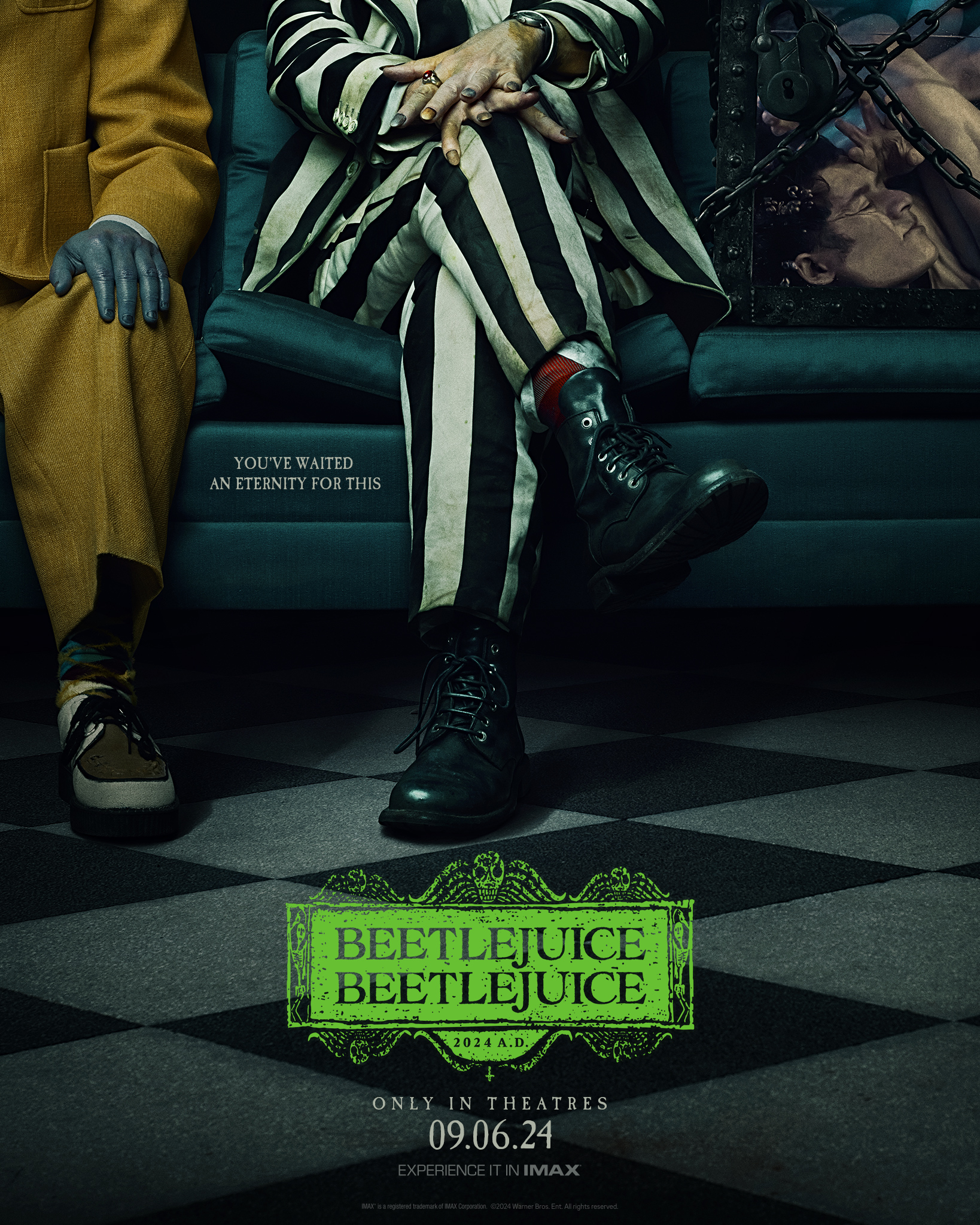
- Starring
- Michael Keaton, Winona Ryder, Jenna Ortega
- Writers
- Alfred Gough, Miles Millar
- Director
- Tim Burton
- Rating
- 14A (Canada), PG-13 (United States)
- Running Time
- 103 minutes
- Release Date
- September 6th, 2024
Overall Score
Rating Summary
Nobody reveres the darkness as much as Tim Burton, but perhaps even the eccentric goth icon had no idea how to react to the blinding dark period of his own career that crept into the new millennium. Initially a sporadic occurrence—for every Planet of the Apes or Charlie and the Chocolate Factory, there was a Corpse Bride or Sweeney Todd to save the day—the frequency of his duds became firmer in the 2010s when the massive commercial success of Alice in Wonderland only meant more eyes were laid on the massive dip in quality that came with the increase in cash flow.
Suffice it to say, Burton’s tumultuous output has been marked by a nagging desire to return to what has worked for him in the past. Stop-motion is always a sure-fire critical success for him? In comes Frankenweenie. Alice in Wonderland, for all of its critical faults, was a box-office smash? Time to take on Dumbo! 1988’s Beetlejuice endures as one of Burton’s more revered classics? That can only mean one thing: Legacy sequel, baby! While the entire existence of Beetlejuice Beetlejuice reeks of corporate money-grubbing mixed with a fading auteur’s desperate grasp for a definite home-run, there is something of Beetlejuice‘s charm to be found in the sequel; sadly, there isn’t all that much, whereas the flaws that plagued the original have no issue crawling out of the grave and haunting Burton’s efforts once more.
Some years after the terrors that initially plagued the Deetz family, the clan finds themselves in shambles. Family patriarch Charles has died—victim of having initially been played by a now-convicted sex offender—leaving his what’s left of his bloodline to mourn. Alongside his conceited wife Delia (Catherine O’Hara), Charles’s daughter Lydia (Ryder) finds this to be a particularly torturous blow, haunted by the memories of her near-death experience at the hands of the endlessly parasitic Betelgeuse (Michael Keaton)—a trauma whose legitimacy the film is far more convinced of than anyone actually watching it. As the family makes peace with Charles’s death, Lydia and her estranged daughter Astrid (Ortega) find themselves at a crossroads that may or may not find a detour in the land of the undead. Throw in a crazed, demonic ex-wife (Monica Bellucci), a transparently scheming fiancé (Justin Theroux) and some Hollywood cop trying to keep the undead in check (Willem Dafoe), and Beetlejuice Beetlejuice has all the makings of a bloated sequel with too many bridges to cross and not enough energy to make it through each one.
Keaton, for his part, slips effortlessly back into the rotting skin of his titular miscreant, but in returning this bio-exorcist to his former manic glory, Beetlejuice Beetlejuice reveals just how little Burton has learned from his first trip through Winter River. Betelgeuse is, above all else, a showman, one more than familiar with the famous adage “Always leave ’em wanting more.” After a certain point, though, as with its predecessor, this sequel finds so little to do with its central trouble-maker, leaving him as little more than a recurring pun-machine with glaring attachment issues and not enough screen-time to let Keaton’s charisma wash over.
The original Beetlejuice also suffered from a lack of the man himself, but the simplicity of that film’s plot at least enabled the brief and pointedly placed touches of Keaton’s presence to feel more intentional in their desire to build anticipation. Here, the same pacing issues are suffered—both films share a meandering sense of storytelling without the urgency to push things forward—but Beetlejuice Beetlejuice has the added problem of throwing in far too many compensatory plot lines to make up for the lacking narrative drive, instead leaving the film to buckle under the weight of its own half-hearted practical makeup effects; with so many characters to follow, one would think they were watching a goth kid’s reinterpretation of a Robert Altman film.
This added sense of plot propulsion wouldn’t inherently be an issue with the film if Beetlejuice Beetlejuice felt more secure in where it actually wants to take these storylines and new characters. Burton, though, is so clearly unsure of the value these digressions even afford the narrative; character threads and conflicts introduce and solve themselves at a moment’s notice, leaving nothing more than a superficial interest in these new shades of paint brushed across the intricate town model that the Maitlands have left behind.
At the same time, the brevity and anticlimactic air of these subplots doesn’t even contribute to any cheeky subversion of expectations, for the characters driving these diversions have so little in the way of personality—calling it a lack of “dimension” would probably be perceived as a compliment to these ghouls—that one is left to wonder what Bellucci, Dafoe and Teen Heartthrob #4218 even contributed to this project in the first place; cut these storylines out, and the film would largely feel unchanged.
With regards to its auteur’s creative journey, the most Beetlejuice Beetlejuice has to offer is a reflection of the undead drive to create from a dearth of motivation—a reality that has been plaguing Tim Burton for decades now, like a soul-sucking demon that won’t leave him in peace.
still courtesy of Warner Bros. Pictures
If you liked this, please read our other reviews here and don’t forget to follow us on Twitter or Instagram or like us on Facebook.
Discover more from
Subscribe to get the latest posts sent to your email.
